World Bank can aid Philippine Land Development, Official Says
[Reuters]
Published date: 2nd Jun 1987
View PDF2 June 1987
Reuters News
English
(c) 1987 Reuters Limited
MANILA, June 2, Reuter – The World Bank’s policies prevent it lending money to the Philippines for the transfer of land from landowners to the poor, but it can help finance subsequent development costs, a bank official said today.
“The World Bank by its established policies cannot use its resources to finance the transfer of assets from one group to another,” Rolando Arrivillaga, representative in the Philippines, told Reuters.
“However, the bank … can finance the development aspects of the (land reform) program,” he said in an interview. He said the reforms could be an interesting model for other countries.
President Corazon Aquino wants to break up big rice, corn, banana, coconut and sugar plantations.
Supporters of the proposal, which is opposed by many landowners, say it will help end support among landless peasants for communist insurgents.
Arrivillaga said a World Bank report saying the bank would not finance compensation for land transfers did not mean the bank would give no help at all to the government’s ambitious land reform program.
The report was drawn up after a bank mission visited the country in March.
“We will deal with the part of the program that deals with how to put the land to effective use once it has been transferred,” Arrivillaga said.
The bank could help fund investment on farms that had been handed over to new owners, he said.
An Aquino spokesman said last week she was committed to launching the program, which will limit holdings to seven hectares (15 acres), by using decree powers she holds until a new Congress convenes in July.
The spokesman, Teodoro Benigno, said the land reform program, estimated to cost about 44 billion pesos (2.2 billion dollars), would take place in four phases and benefit 2.6 million farmers.
Benigno said the first two phases would complete the transfer of rice and corn land, land sequestered or foreclosed by the government and abandoned farmland. A total of 1.15 million hectares (2.8 million acres) would be affected.
But Aquino would leave redistribution of sugar, banana and coconut plantations to Congress, Benigno said.
Arrivillaga said government aid donors, who form part of a consultative group led by the World Bank, might be prepared to finance land transfers.
The international financing community was watching the Philippine land reforms with great interest, he said.







